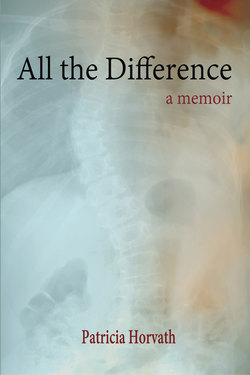Читать книгу All the Difference - Patricia Horvath - Страница 13
На сайте Литреса книга снята с продажи.
ОглавлениеTests
I’m straddling my red Schwinn bike, from which the training wheels have been removed. My mother holds onto the fender, steadying me. For nearly an hour I’ve been trying unsuccessfully to balance. I am eight years old, past when the training wheels should have come off. Younger kids, my six-year-old brother among them, are already whizzing around our cul-de-sac. Chipper keeps circling by on his orange two-wheeler with the banana seat. He’s gone from taunting me to shouting encouragement, realizing, I suppose, that something just isn’t right. Ready? my mother says, Keep peddling! She lets go. For two, three seconds I manage to stay aloft, then the bike wobbles and I skid on the asphalt, skinning my hands and knees. I struggle to my feet, and this time I do not pick up my bike. Let it stay there, let it rust. I go inside, find a book. I will try again, try all summer, before giving up entirely.
In elementary school I quickly learned that what matters occurs outside the classroom. On blacktops and playing fields, alliances formed. The race really went to the swift—and social prominence too. But I got tangled in jump ropes, couldn’t hit a ball, ran races too slowly (my right foot heading in a different direction altogether from the rest of my body). Sports were an impossibility; I didn’t even like to watch. Unless the game was basketball, where my height was an asset, I resigned myself to being last picked—the scrub choice. I was shy, uncoordinated, a socially awkward girl voted “Most Likely to Succeed” by sixth grade classmates who, like me, had little notion of adult success. I told myself being last didn’t matter. Eventually we’d return to the classroom where the team captain could barely stutter his way through a paragraph and the blacktop queen would flub the spelling bee. After school, though, no one rushed outside to play Spelling Bee.
The difference between my own shortcomings and those of my classmates seemed to me largely a matter of exposure. If someone flunked a test, that was between her and the teacher. No one posted the scores. But my lack of coordination was on display every single day. I felt this distinction keenly, never more so than during the annual Presidential Fitness Test.
This was actually a series of tests—chin-ups, push-ups, high jumps, sprints—most of which I failed. Each year I knew I was going to fail; my classmates knew it too. What I resented was the prominence accorded the tests—the theatrics of them, the applause for high scorers, the exhortations of our gym teacher with her stopwatch and bully’s whistle, her back slaps and admonishments. Don’t be a baby! Toughen up! Her formula was simple: tough kids aced the test; babies flunked.
I panted through races where I came in last. I clung to the chin-up bar, trembling, unable to hoist myself level. I toppled sideways trying to do cartwheels and forward rolls. And for what? At the time Lyndon Johnson was President, then Richard Nixon. I couldn’t picture either of them—the jowly cowboy, the shifty-eyed man with the raised shoulders—mastering even a single cartwheel, let alone the entire test. Yet each had become the most powerful man on earth. How much did fitness really matter?
The kids who could chin themselves repeatedly, hit homers, and run fast—where were they running to? Every night on CBS Walter Cronkite intoned the number of dead. Those who could not touch their toes or who were smart enough (and fortunate enough) to get into college were spared. The “tough kids,” blacktop bullies, had no use for books. They excelled at all things physical, and this was their time. But who, I wondered, would applaud these high scorers once they’d grown up?
